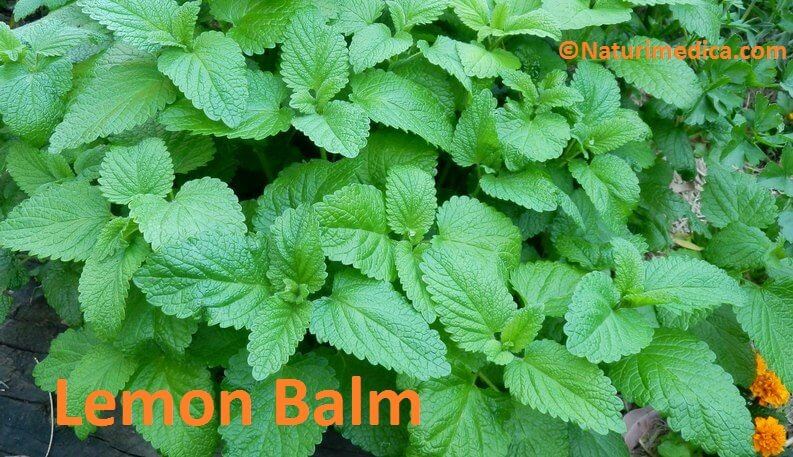Lemon balm (Melissa officinalis) has been cultivated in the Mediterranean region for more than 2000 years where it had a deserving reputation as a herb enhancing longevity and mood. Regretably, nowadays not many people are aware of this lovely tasting and effective herb and how easy it is to use.
I have many lemon balm bushes in my garden (see the photo above) that are harvested regularly almost all year round. The leaves are best used as tea which makes an aromatic drink to have in the evening to relax and unwind.
I usually pick a handful of leaves and tear them to release the aroma of the essential oils, add hot water and a bit of honey – this is simply wonderful and so comforting!
It’s a treat anytime but it’s best enjoyed after dinner (it helps digestion) or around 30 minutes before sleep to relax. Honey and lemon balm go particularly well together.
Lemon balm’s scientific name is Melissa officinalis, “Melissa” is a Latin derivation of the Greek word for honey bee (“officinalis” indicates that the plant is medicinal in nature). I can certainly confirm this as my lemon balm bushes attract plenty of the neighbourhood bees!
Medicinal uses of lemon balm include:
- Antiviral – lemon balm is effective against a number of viruses such as ones causing warts, cold sores and herpes. Some studies suggest that topical ointments containing lemon balm help speed up the healing of cold sores caused by the herpes simplex virus. Researchers also noted a significant reduction in the frequency of herpes recurrence when using lemon balm. It is also helpful with chronic fatigue syndrome and shingles.
- Calming and sedative action – it lowers fever, relaxes gut spasms and improves digestion, calms a nervous stomach and relieves colic. The leaves are reputed to also lower blood pressure. It is a very gentle herb therefore it is often used for children and babies.
- Skin problems – such as eczema, wounds and insect bites. Lemon balm’s antihistamine action is useful to treat eczema and accounts for the centuries old tradition of placing the fresh leaf on insect bites and wounds.
- Mild depression and anxiety – historically, lemon balm has been used for treating anxiety and depression. Fresh plant extract is used for sadness, mild depression and anxiety, especially for children.
- Insomnia, especially stress related – several studies have used lemon balm, and lemon balm/valerian combinations to treat stress, anxiety and insomnia. The studies have shown improved sleep patterns and reduced stress and anxiety. Lemon balm is also used with St John’s wort in the treatment of depression in association with viral infection, and for SAD (seasonal affective disorder). Lemon balm is approved for “nervous sleeping disorders” and “functional gastrointestinal complaints” by Commission E of the German Federal Institute for Drugs and Medical Devices. Commission E is the German governmental agency that evaluates the safety and effectiveness of herbal products.
- Hyperthyroid (overactive thyroid) – I have been successfully using lemon balm in the treatment of anxiety disorders, especially when the anxiety is associated with hyperthyroid conditions such as Graves’ disease (an autoimmune disorder). Studies indicate that the herb slows down the function of pituitary gland which inhibits the production of thyroid-stimulating hormone (TSH) thus reducing thyroid hormone levels (T3 and T4).
- Heart palpitations (arrhythmias) – it relaxes heart muscles and lowers anxiety associated with abnormal heart rhythms.
- Memory enhancer – great for students, the elderly and everyone else who needs to boost memory.
- Muscle relaxant – the volatile oils in lemon balm contain chemicals that relax muscles, particularly in the bladder, stomach, and uterus, thereby relieving cramps, gas, and nausea.
Culinary uses
In addition to teas, lemon balm is also very nice in fruit salads and it goes well with tarragon as a seasoning for chicken or fish. Add some freshly minced leaves to lamb or fish marinades for the barbeque, and toss a few sprigs on the fire to perfume the air and keep away the mosquitoes.
Cautions
When lemon balm is used with both prescription and non-prescription drugs that promote sleepiness, the effects of the drug may be exaggerated, resulting in sedation or temporary mental impairment which may interfere with driving or operating machinery.
Lemon balm may also cause excessive sedation if it is taken in excess with other potentially sedating herbs such as Hops, Kava, St. John’s wort or Valerian.
Due to its potential effects on thyroid hormone utilisation, lemon balm may interfere with therapy for hyperthyroidism (thyroid hormone excess) or hypothyroidism (thyroid hormone deficiency).
The above material is meant as information only. Always consult a qualified herbalist before using herbs in any form.
If you’d like to consult a professional herbalist, please get in touch with me. I help clients Australia-wide via Zoom or phone.
Joanna Sochan
Holistic Health and Lifestyle Therapist
Natural and Lifestyle Therapies for Abundant Health and Wellbeing
Additional resources
- Know and love your herbs – Coriander
- Know and love your herbs – Sage
- Gotu kola: uses and benefits for skin, stomach ulcers and memory
- Tribulus: a very special herb
- Wake up at the same time every night? Read on!
Disclaimer: The above material is for informational and/or educational purposes only. It should not be used to self-diagnose and it is not a substitute for a medical advice, diagnosis, treatment, prescription or recommendation. All viewers of this content, especially those taking prescription or over-the-counter medications, should not make any changes in their health regimen or diet before first consulting a doctor or other qualified health provider with any questions they may have regarding a medical condition or their particular circumstances.

Joanna Sochan is a Natural Therapist and founder of Naturimedica Holistic Health & Wellness. She has a passion for helping clients transform their lives by becoming healthy and well naturally. Joanna has 10+ years experience in clinical practice and has special interest in solving complex cases, functional medicine testing, gut health, sleep, fatigue and chronic pain. She guides clients through her tailored programs and eCourses as well as helping them individually (mostly online) Australia-wide. View full bio.
 Print This Post
Print This Post 

I have had acid reflux for years ,everything i eat comes back up i mean everything,but i don’t know what to do about it.Could you help me please.
Hi Doris
Are you based in Australia?
What is good for acid reflux everything I use it doesn’t help
It very much depends what’s causing your reflux. If it’s low stomach acid then you need to address this first. Another common cause is bacterial imbalance in the small intestine (e.g. SIBO – small intestine bacterial overgrowth). It could be histamine intolerance. So as you see there are many causes that need to be addressed with specific supplements/ foods. I suggest you see a naturopath who could help you with investigations.
This information about lemon barm gas bee a great help to me. Thankyou. Marg x
Thank you for taking the time to comment Marg! You may also want to read my other posts on herbs I use in my clinic under the Herbal Medicine category on the right.